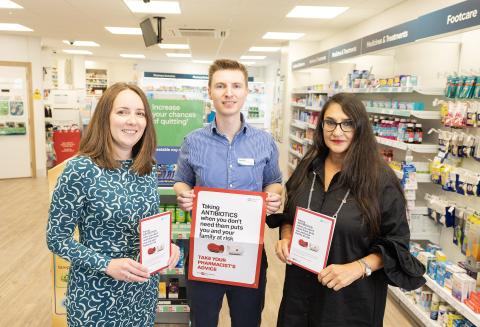‘Keep antibiotics working’ Living Well campaign launched

As part of the Living Well service throughout October and November community pharmacies are highlighting the importance of keeping antibiotics working.
Living Well is a community-based pharmacy service offered in over 500 pharmacies across Northern Ireland. It is delivered in partnership with the Public Health Agency (PHA), Community Pharmacy NI (CPNI), and the Department of Health (DoH).
Antibiotics are needed for serious bacterial infections. When antibiotics are not used correctly, the bacteria they are designed to treat can become resistant, this is known as antimicrobial resistance (AMR). AMR is one of the biggest threats to human health.
AMR occurs when microbes (bacteria, viruses, fungi and parasites) change over time and no longer respond to medicines making infections harder to treat. The more we use antibiotics, such as penicillin, and other antimicrobial medicines the less effective they become.
Dr Amanda McCullough, AMR Programme Manager at the PHA said: “We use more antibiotics than we need to and because antibiotics are not always used appropriately, many bacteria are becoming resistant.
“As a result, some antibiotics have become less effective against the bacterial infections they were designed to treat. Infections caused by resistant bacteria can be very difficult to treat and can be serious.
“Pharmacists are well positioned in the community to help inform the public on how to use antibiotics appropriately. They also have an important role in identifying when it is the correct time to use an antibiotic and when self-care is more appropriate.”
As a result of drug resistance, antibiotics and other antimicrobial medicines become less effective and infections become increasingly difficult or impossible to treat.
Community pharmacist Adam Hill said: “It’s important we remember that antibiotics are not effective against simple infections, such as a cold or flu. Most simple infections clear up on their own and most coughs, sore throats or earaches do not need antibiotics. Your body can usually fight these infections on its own.
“The first place to get advice on these types of infections is your community pharmacy. Pharmacists are medicines experts and can provide valuable advice and also recommend over-the-counter medicines to help manage your symptoms.
“As we move through winter, we do tend to see more people with minor illnesses that won’t need antibiotics, and we can advise patients about when they may need to see their GP. So, remember to seek help and advice from your local community pharmacy first.”
Dr Sumanthra Varma, Pharmacy Adviser at the Strategic Planning and Performance Group (SPPG) said: “Antibiotic resistance is something that affects everyone, so it’s important that we all take steps to help keep antibiotics working. Community pharmacies can offer one-to-one advice from a healthcare professional, often without the need to book an appointment.
“If you have a minor ailment or require a consultation about a recent health issue, your pharmacist can help. Pharmacists are highly-trained healthcare professionals who have a vast knowledge of symptoms and appropriate treatments. They can advise what medication to take, the dosage required and any side effects, and provide advice on how best to use it.
“If your doctor prescribes an antibiotic, the pharmacist can give you advice on how best to take it. Follow the instructions, complete the course and don’t just stop because you’re feeling a bit better.
“And remember, never share antibiotics with anyone else.”
For more information, pick up a free Keep antibiotics working leaflet at your local community pharmacy and visit www.nidirect.gov.uk/antibiotic-resistance
